BTN News: In a recent report by the Institute for the Study of War (ISW), a prominent American think tank known for its detailed analysis of the ongoing Ukraine conflict, a stark message has been sent to the West: act decisively against Russia or risk missing a crucial opportunity. The report highlights a range of vulnerabilities within Russia that, according to the ISW, have not been adequately exploited by Western powers. Instead, the report criticizes what it describes as the “incrementalism” of the United States, which has inadvertently allowed the Kremlin to mitigate and obscure its own weaknesses. This call to action underscores the urgent need for a strategic shift in how the West approaches the conflict in Ukraine, emphasizing that now is the critical moment to capitalize on Russia’s frailties.
The ISW report delves deeply into the current state of Russia’s war efforts, identifying key weaknesses that Western powers could exploit to shift the balance of the conflict in Ukraine’s favor. Among the most notable vulnerabilities is Vladimir Putin’s perceived inability to rapidly change course, a reliance on external support to sustain Russia’s war efforts, and the accumulation of long-term risks that the Russian president has yet to address effectively. These factors, according to the ISW, make the Kremlin particularly susceptible to a well-coordinated and sustained Western strategy that could outmaneuver Russia and prevent it from regrouping and adapting to changing circumstances on the battlefield.
The ISW’s analysis further suggests that a serious U.S. strategy in Ukraine should focus on generating momentum against Russia, thereby denying it the ability to regroup and adapt. The report argues that by applying consistent pressure, the West can force Russia into a reactive position, exploiting its strategic inertia and the vulnerabilities that arise from it. This approach, the ISW experts contend, would not only prevent Russia from maintaining its war effort but could also lead to significant setbacks for the Kremlin on multiple fronts.
Moreover, the think tank calls for a departure from the West’s traditionally reactive stance towards Russia. Instead of merely responding to Russian actions with countermeasures, the ISW advocates for a proactive strategy that anticipates and preemptively blocks potential Russian maneuvers. This would involve a more dynamic and forward-looking approach, one that imposes the most painful dilemmas on the Kremlin, thereby exacerbating the pressures already mounting within Russia.
One of the key points emphasized in the report is the importance of helping Ukraine regain maneuverability on the battlefield. The ISW highlights the recent military operations in Kursk as an example of the kind of momentum that needs to be built upon. By providing Ukraine with the necessary support to sustain and expand such operations, the West can capitalize on the current opportunities to weaken Russian positions further.
The report’s conclusions are clear: the persistence and momentum of the United States, in particular, are critical to undermining Russia’s ability to continue its war against Ukraine. The ISW experts stress that this is not just about imposing multiple dilemmas on the Kremlin but about choosing those that will have the most severe impact. By doing so, the West can ensure that Russia remains on the back foot, unable to effectively respond to the evolving situation on the ground.
In essence, the ISW’s message to the West is a call to abandon a passive, reactive mindset and instead embrace a more assertive and strategic approach. By anticipating Russia’s likely shifts in strategy and taking steps to block them before they can be executed, the West can significantly alter the course of the conflict in Ukraine. The think tank’s recommendations are a reminder that the current moment represents a critical juncture in the war, one where decisive action could lead to substantial gains for Ukraine and its allies. The time for incrementalism, the ISW warns, has passed. The opportunity to exploit Russian vulnerabilities is now, and it may not come again.


